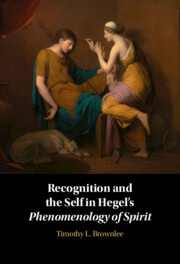
-
Select format
-
- Publisher:
- Cambridge University Press
- Publication date:
- December 2022
- December 2022
- ISBN:
- 9781009099141
- 9781009098236
- 9781009096904
- Dimensions:
- (229 x 152 mm)
- Weight & Pages:
- 0.5kg, 244 Pages
- Dimensions:
- (229 x 152 mm)
- Weight & Pages:
- 0.359kg, 244 Pages
- Subjects:
- Nineteenth-Century Philosophy, Philosophy
You may already have access via personal or institutional login- Subjects:
- Nineteenth-Century Philosophy, Philosophy
Book description
Hegel's Phenomenology of Spirit is famed for its account of the problem of recognition. Yet while readers agree about the importance of its influential accounts of the struggle to the death and the master/slave relation in developing that problem, there is no consensus regarding what sorts of relations among subjects would count as successful forms of recognition. Timothy Brownlee articulates the essential connections between Hegel's concepts of recognition and the self, and presents a novel interpretation of the Phenomenology that traces the emergence of actual relations of reciprocal recognition through the work as a whole. He focuses on the distinctive social constitution conception of the self that Hegel develops in his account of 'spirit,' and demonstrates that the primary significance of recognition lies in its contribution to self-knowledge. His book will be valuable for scholars and students interested in Hegel, German Idealism, and philosophical conceptions of recognition.
Reviews
‘An impressive work of scholarship, this book is a welcome addition to the literature on Hegel. Addressing two central topics – the accounts of recognition and of the self – in the Phenomenology of Spirit, it offers a new, persuasive interpretation of their roles and dynamics in Hegel's text. Brownlee writes with clarity and conviction that stem from his mastery of Hegel's thought and from the penetrating analysis of the key philosophical concepts he discusses. This study is essential reading for any student and scholar of Hegel.'
Marina Bykova - North Carolina State University
Contents
Metrics
Altmetric attention score
Full text views
Full text views help Loading metrics...
Loading metrics...
* Views captured on Cambridge Core between #date#. This data will be updated every 24 hours.
Usage data cannot currently be displayed.
Accessibility standard: Unknown
Why this information is here
This section outlines the accessibility features of this content - including support for screen readers, full keyboard navigation and high-contrast display options. This may not be relevant for you.
Accessibility Information
Accessibility compliance for the PDF of this book is currently unknown and may be updated in the future.


